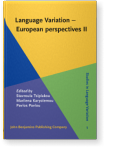Syntactic variation in German-English code-mixing
This paper presents a quantitative account of the syntax of a contemporary German-English mixed code. It shows that the bilingual informants possess two identifiable linguistic systems, each with its grammatical rules, and that the mixed variety results from the interaction between lexical elements and grammatical rules from these languages. The syntactic analysis demonstrates that the principles guiding code-switching are probabilistic (rather than universal). The syntactic theory used for the analysis of the data (Word Grammar; Hudson 2007) furthermore reveals a syntactic processing factor as a facilitator of code-switching: dependency distance, i.e., the number of words between a head and a dependent.
